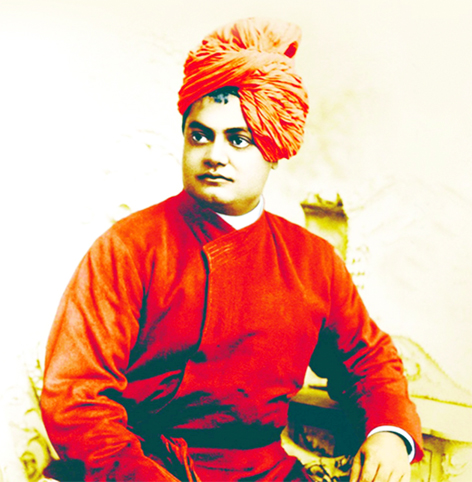Brij Mohan Sharma
Today marks the blessed birth anniversary of Swami Vivekananda, the revered patriot-monk of Bharatvarsh, whose inspiring call awakened our nation from its prolonged slumber. He urged the people to unite and break free from the chains of foreign rule, seeking to restore India’s freedom and the rich heritage that had been clandestinely taken by foreign invaders over the centuries.
Swami Vivekananda challenged the masses to “arise and awaken… sleep does not suit you… Do not perceive yourselves as weak and insignificant… Proclaim your strength to the world… and witness how the reality shifts, how everything transforms with a sudden spark of energy…”
Inspired by Swamiji’s passionate patriotism, Nobel Laureate Romain Rolland remarked, “He (Vivekananda) embodied energy, and action was his message to humanity. He was the force that liberated India from centuries of stagnation, revealing the reservoir of mysticism that lay dormant within her, unleashing ripples of profound change…”
Swami Vivekananda’s contributions to India’s revival and global betterment are widely acknowledged. Although he lived a brief life in the late 19th century, actively engaging in societal issues for just under fifteen years, the impact of his work and the legacy he left behind are timeless. His teachings retain a vibrant relevance, inspiring generations.
Mahatma Gandhi expressed, “My love for my country multiplied a thousandfold after delving into his works.”
It’s heartening to see some of today’s prominent leaders striving to align with the progressive and revitalizing principles espoused by Swami Vivekananda for the betterment of the Indian nation. Unfortunately, there are still those who resist these noble efforts, clinging to outdated divisions and religious fanaticism, which have plagued our nation since colonial times, eroding our rich cultural values. They do not realize that our dreams of establishing a harmonious, prosperous nation cannot materialize unless we unite, eliminate class divides, and shed our arrogance, pride, and rigid mindsets.
Swami Vivekananda was a multifaceted genius—philosopher, activist, contemplative yogi, prolific writer, dynamic speaker, and gifted conversationalist. Deep within, he was a true lover of God, a sentiment that resonated in his profound love for humanity. This love captivated the hearts of those who encountered him, whether in the East or the West. He traveled extensively across India and ventured into Eastern Asia, Europe, and the United States.
His rise to prominence came at the Parliament of Religions in Chicago in 1893, where he represented Hinduism. His compelling and impactful speeches captivated audiences, leaving a lasting impact on the hearts of Americans, especially when he affectionately addressed them as “Sisters and Brothers of America.” His extensive knowledge of Hinduism and other faiths resonated deeply with the diverse gathering.
Vivekananda’s mission in America was primarily to present India’s spiritual culture, particularly within a Vedantic framework. He emerged as India’s spiritual ambassador, fostering understanding and a harmonious blend of Eastern and Western philosophies. His message of the soul’s divinity, the unity of existence, and religious harmony found a lasting influence in American thought.
Historically, Americans and other nations held many misconceptions about Indians, often perceiving Hindus as uncivilized, superstitious, and primitive. Swamiji’s lectures dispelled these myths and sparked interest in Hinduism. Many enlightened individuals began embracing Hindu concepts. The adaptability of Hindu philosophy made it especially appealing to the advanced and intellectual circles in America and Europe.
Swami Vivekananda elucidated that “Every soul is potentially divine. The objective is to manifest this divinity by mastering both external and internal nature, whether through work, psychic control, philosophy, or a combination of these, and attain freedom. That encapsulates the essence of religion. Doctrines, dogmas, rituals, books, temples, and forms are but secondary matters.”
In his inaugural address at the Parliament of Religions, he proudly stated, “I belong to a religion that has taught the world the principles of tolerance and universal acceptance. We not only believe in universal toleration but also accept all religions as true.” To illustrate this, he cited a hymn from his youth: “As the different streams, having their sources in diverse places, all flow into the sea, O Lord, the different paths men take, despite their variations, all lead to You.”
He passionately asserted that “Sectarianism, bigotry, and fanaticism have long plagued our world, causing violence, bloodshed, and despair across nations. Without these harmful demons, society would be far more advanced.”
What lies at the heart of this degeneration? Many act like a frog confined to a well, unaware of the vastness of the sea beyond. To the frog, nothing exists beyond its limited perspective. This mindset is the root of our difficulties. Each sect believes its narrow view encompasses all truth, fostering parochialism and its extremities. To genuinely live as humans, we must endeavor to dismantle these barriers of divisive thinking.
Swami Vivekananda wrote, “Holiness, purity, and charity are not the sole dominion of any one religion, and every faith has produced individuals of exceptional character. Those who dream of their religion’s absolute superiority over others deserve my deepest sympathy.”
Thus, the misrepresentation that Swami Vivekananda was merely a fanatical Hindu must be entirely rejected. In reality, he was a champion of humanity, devoted to promoting peace and brotherhood rooted in the spiritual truth of Vedantic unity.
He argued that our personal egos are the root of our misery. When we consider ourselves separate from others, it breeds hatred and jealousy alongside many other afflictions. Eliminating this false sense of individuality dissolves all evils and sorrows. Love is the fundamental law of existence. Love binds us and fosters unity. In a state of unity, there is no room for fear, danger, conflict, or strife. When we recognize that we are all one, who would we hate, who would we fight against? Understanding this reveals the true essence of life and existence—it is perfection and divinity, as Swami Vivekananda proclaimed.
(The author is a former Additional Secretary to the Government)


Leave a Reply